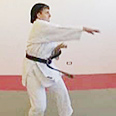
Let them kick: Religious women try karate
Martial arts were never the primary domain of women, especially religious women. But at El Halev things are totally different
Imagine that the biblical Dina had mastered martial arts and had not wandered around by herself near the tents of Shechem. With a few simple jujitsu moves she could have prevented Schechem from raping her and leaving her on the ground with broken ribs and a painful knee.
This would also have prevented the rather extreme outburst of Simon and Levi, who killed all the men of Shechem, and they might have received a better blessing than the one they got from their father before his death.
But as we know, Dina went out without any knowledge of karate or Krav Maga, and unfortunately, like many women, she was kidnapped and raped. The rest, together with the other Bible stories, is history.
El Halev in Jerusalem, Rehovot, and Tel Aviv attempts to give women the tools to confront their attackers and any woman who wants to can practice a variety of martial arts there. Because it is for women only, religious women can feel comfortable going there to learn how to defend themselves.
Open-mindedness
Odelia Shmueli, an ultra-Orthodox woman who attended a Bet Yaakov school, takes classes at El Halev in Jerusalem. She always liked sports, but gym classes in her school were on a very low level. She heard about El Halev, went to try it out, and was excited by what she saw. She mainly does Capoeira because there is something liberating about it, and it also improves her strength.
“Most of my friends don’t know about martial arts, but when I explain to them that it is not a problem in terms of Jewish law, and that it is only women who work out there, they get very excited,” she says. “The atmosphere at the center is very warm, and all types of women go there—secular, religious, ultra-Orthodox—and the training also leads to an intellectual openness and to getting to know the others.”
One of the instructors at the center, who has been teaching Krav Maga for seven years, recalls how as a child she would trail along after her big brother to judo class. There were no judo classes for girls then, and it remained only a dream for her.
After she finished school and did her national service, she chanced upon a pamphlet for a Krav Maga course at the Wingate Institute and decided to take it. Classes were coed but she made sure to compete with a female partner. She was one of the few religious women in the course, but they managed to get the classes held on the Sabbath canceled, and the last class each week was held Friday afternoon.
How did her parents react? Her mother viewed her choice as a compromise with Jewish law, and there was also a certain fear that this would affect her chances of finding a husband—because she wore pants when training and was in a coed group—but after they saw that this was a professional choice, they supported her and encouraged her. She herself sees her work as a mission; now other women who study martial arts can have religious instructors like her.
She is not worried that having children will harm her chances of advancement. She cites as her role model Yudit Sidikman, El Halev’s treasurer, a mother of five and an instructor at the center as well. Sidikman, by the way, did not start El Halev for religious reasons, but because she believes that women and men have different training approaches and needs.
Wearing a skirt with pants
Another instructor at El Halev is Shirel Terel, married and the mother of two children, who lives in Jerusalem’s Romema neighborhood. Her husband studies in the ultra-Orthodox Mir yeshiva, and she supports the family as a Capoeira instructor.
Terel teaches women, but she continues to study in a coed group with her master. She trains wearing a short skirt over her pants, and she wears a head covering. She knows that she cannot advance without taking part in coed groups, but in the future, women who want to train only with other women will have the option.
Among the groups who come to learn Capoeira with Terel there are ultra-Orthodox girls from Bet Yaakov and Bet Yisrael schools, and she is pleased that they can learn with a female instructor. She tells her neighbors who ask what she does for a living that she works for a non-profit organization. Only if they really press her does she go into detail. And if, God forbid, someone dares to attack her, he will also find out the details, without a lot of words exchanged.










